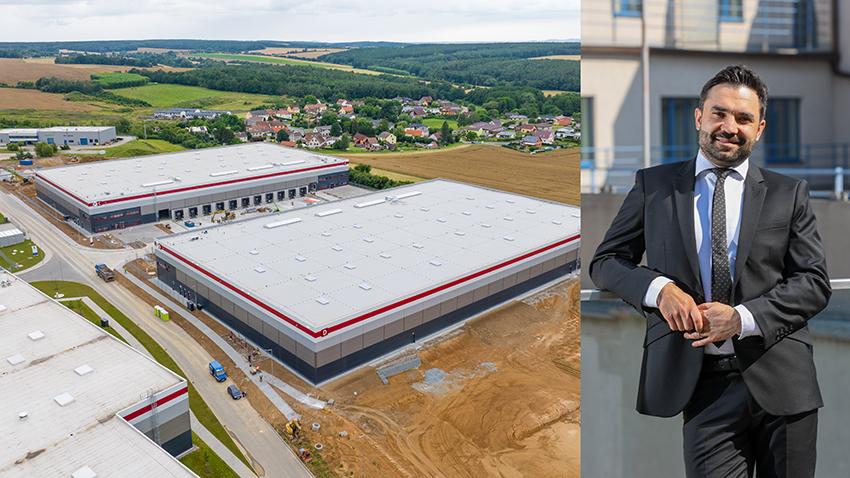P3 Czech Republic’s Aleš Zacha discusses the evolving landscape of logistics real estate
In an exclusive CIJ EUROPE interview with Aleš Zacha, Head of Development of P3 Czech Republic, shared insights into the logistics and warehousing sector’s growth and transformation in the wake of the pandemic.
CIJ EUROPE: The logistics and warehousing sector has seen significant growth post-pandemic. How do you foresee the future of logistics real estate evolving, particularly in the Czech Republic?
Zacha noted that while the post-pandemic landscape was initially challenging, the logistics sector, particularly e-commerce, experienced remarkable growth. “We were all waiting to see what would happen, but we realized that demand continued to grow. Rent levels increased quarterly, which was amazing, especially in our portfolio around Prague. We witnessed zero vacancy rates; any available space had a queue,” he remarked.
However, he highlighted the impact of geopolitical factors, particularly the war in Ukraine, which led to a decline in demand in 2023, a trend that has persisted into 2024. “E-commerce drove growth, but supply chain disruptions from Asia due to pandemic-related issues highlighted the need for companies to stock inventory within Europe,” Zacha explained. This shift is leading to near-shoring strategies as companies aim to mitigate risks associated with global supply chain vulnerabilities.
CIJ EUROPE: What role does near-shoring play in the future of logistics and manufacturing in the Czech Republic?
Zacha elaborated that the trend toward near-shoring is gaining traction in both logistics and manufacturing. “It’s not a quick process; relocating manufacturing takes time and careful planning. While logistics can shift more rapidly, manufacturers require more substantial investments and timeframes,” he said. He also noted that big Asian e-commerce platforms are increasingly seeking to establish warehouses in Europe to better serve their customer bases.
CIJ EUROPE: How is P3 Parks addressing the growing importance of sustainability in logistics real estate?
Sustainability is a priority for P3 Parks, according to Zacha. “We have implemented various green initiatives, including adhering to BREEAM certification standards for new constructions and incorporating solutions for rainwater usage and renewable energy sources,” he stated. “We are also installing EV charging stations and ensuring our buildings meet modern sustainability criteria.”
However, Zacha acknowledged the challenge of balancing sustainability with client demands. “While many clients want sustainable systems, not all are willing to invest in the necessary upgrades. We believe this will change over time, as supply chain pressures will compel companies to embrace more sustainable practices,” he added.
CIJ EUROPE: What are P3 Parks’ plans for further expansion in the Czech Republic?
Zacha outlined P3’s growth strategy, which includes new developments and acquisitions. “We are focused on land banking and identifying new development opportunities, with a current lettable area nearing 9 million square meters and a portfolio value approaching €10bilion. We aim to grow even more,” he stated.
When considering new land acquisitions, Zacha emphasized the importance of accessibility to highways and workforce availability. “We are looking for locations beyond just prime areas like Prague and Brno. Our focus is on finding opportunities with good access to key markets and industries, particularly those connected to the German market,” he explained.
CIJ EUROPE: Urban logistics is gaining traction as cities grow. How is P3 Parks adapting to this trend?
While P3 primarily focuses on large logistics parks, Zacha acknowledged the rising demand for last-mile delivery centers. The company is currently exploring redevelopment opportunities in urban areas across Europe, including the Czech Republic. “We are aware that securing land in urban settings can be challenging due to higher competition from residential and office developers. Nonetheless, we remain open to opportunities, particularly in Prague,” he said.
CIJ EUROPE: What do you see as the biggest opportunities and risks in the industrial market in the coming years?
Zacha pointed out the automotive sector as both a risk and an opportunity. “The situation in the automotive market is uncertain, especially with the ongoing transition to electric vehicles,” he explained. He also identified rising energy costs in Europe as a significant risk, stating that energy prices are considerably higher than in the US and Asia, which poses challenges for manufacturing and logistics companies.
Conversely, Zacha remains optimistic about e-commerce growth and advancements in technology and production, particularly in sectors like semiconductors. “Czech Republic’s position in the heart of Europe, along with a skilled workforce, keeps it an attractive market for investment,” he said.
CIJ EUROPE: Finally, what does the future hold for P3 Parks in the next ten years?
Zacha envisions continued growth, with a focus on expanding their portfolio through acquisitions and new developments. “Our strategy remains consistent, with a commitment to sustainable, high-quality buildings. We want to ensure our developments are aligned with market demands for carbon neutrality and efficiency, which will ultimately enhance the value of our properties,” he concluded.
As the logistics and warehousing landscape continues to evolve, P3 Parks is strategically positioning itself to navigate challenges and seize opportunities in the Czech Republic and beyond.
Source: ©CIJ EUROPE








